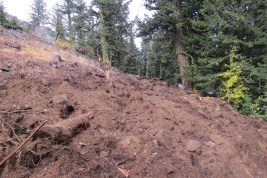Restoring lynx habitat near Coxit Mountain and Loomis State Forest
Conservation Northwest / Nov 05, 2018 / ATVs, Okanogan Working for Wildlife
After decommissioning nearly 3 miles of unauthorized, user-built trail near the Loomis State Forest, Canada lynx and other species can enjoy greater security and movement through this critical habitat.
By Keiko Betcher, Communications and outreach Associate
When it comes to connecting and restoring landscapes, every section counts. Especially for endangered species like Canada lynx.


This fall, we restored important habitat for lynx and other species by decommissioning an unauthorized 2.8-mile motorized trail near Coxit Mountain on the Loomis State Forest.
Before 2010, this ridgeline was remote and roadless, and important habitat for Canada lynx, mule deer and other wildlife. However, it has since experienced disturbance and resource damage from illegal motorized use. What was a temporary fire line became an unauthorized, user-built motorized-vehicle trail on state land.
Fortunately, as a part of the Working for Wildlife Initiative, and with support from the National Fish and Wildlife Foundation (NFWF), we partnered with the U.S. Forest Service to return this area to healthy wildlands. By planting native vegetation and dismantling the user-created trail, it can resume its role in supporting the larger swath of critical habitat for lynx and many other species.
“Restoring this area revives important security habitat just south of the Loomis Forest for threatened Canada lynx that strongly depend upon all remaining habitat in the North Cascades, especially here at the eastern edge of the range bordering the Pasayten Wilderness Area,” said Jen Watkins, Conservation Associate.

This work under the collaborative Working for Wildlife Initiative, lead by NFWF and coordinated by Conservation Northwest, builds upon our successful effort to protect 25,000 acres critical lynx habitat in the Loomis State Forest from logging, indefinitely. By keeping this habitat healthy and wild, we are helping to provide a safe, high-quality space for this elusive feline species that our organization and many others are working to recover.

The area is also home to mule deer, moose, wolves and many other iconic species, as well as prized by hikers, campers and others for its solitude and highcountry vistas.
Learn more about Canada lynx and our efforts to restore them through the Working for Wildlife Initiative!

